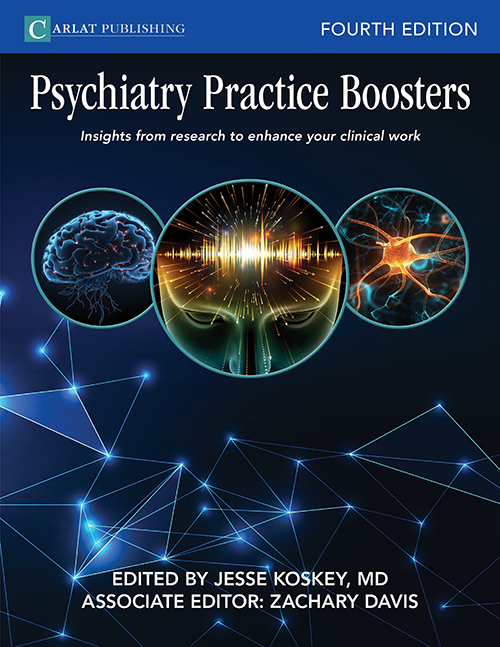Home » Unpacking Aggression Associated with ADHD
Unpacking Aggression Associated with ADHD
October 18, 2021
From The Carlat Child Psychiatry Report
 John C. Blader, PhD
John C. Blader, PhD
Child and adolescent psychologist at the University of Texas Health Science Center, San Antonio, TX. Dr. Blader has disclosed that he has received funding from Supernus Pharmaceuticals for one research grant unrelated to this topic and these medications. Dr. Feder has reviewed this article and found no evidence of bias in this educational activity.
CCPR: You recently did a study on stepped treatment for ADHD and aggressive behavior (Blader JC et al, J Am Acad Child Adolesc Psychiatry 2021;60(2):236–251). It is riveting in its relevance to everyday practice. I am thinking of one school-age child who came to me after multiple trials of stimulants and mood stabilizers who was still very impulsively aggressive, where we were considering out-of-home placement. Can you give us an overview of what you did?
Dr. Blader: We enrolled 175 children ages 6–12 years with diagnosis of ADHD complicated by aggressive behavior. They were all treated with stimulants, and of the 151 children who completed the stimulant trial, 96 responded in terms of showing less aggression. The remaining 45 children whose aggressive behavior did not respond to stimulants were randomized to adjunctive risperidone, valproate, or placebo.
CCPR: What was the outcome?
Dr. Blader: While we did find some benefit from the adjunctive medications, the numbers were too small to see a clear difference between risperidone and valproate, if there is one. The message of the study became less about the adjunctive medication and more about the importance of using a structured approach to stimulant treatment for ADHD with aggression. The surprising result was that stimulants alone were so helpful in reducing aggression.
CCPR: Your study reverses our usual expectations. This is extremely helpful in conceptualizing how to improve community care. Tell us what motivated your study.
Dr. Blader: We felt that we needed to find better ways to treat kids with ADHD and low frustration tolerance who get upset at the drop of a hat. We used to call this “masked depression” that got put out in the world as anger. Then we started calling it bipolar disorder or some variant thereof. Now these children are often labeled with the term “emotional dysregulation” and we use DSM-5’s disruptive mood dysregulation disorder (DMDD). This is not a new condition, it’s just being thought of in different ways. Successful treatment of aggressive kids with ADHD is largely about more avid and precise pursuit of first-line treatment.
CCPR: What specific symptoms are you focused on when we talk about aggression in ADHD?
Dr. Blader: The underlying ingredients have always been problems with impulse control, with something else affective going on. And it’s that affective piece that has influenced trends in combination medication treatment or the more pejorative polypharmacy, without much data to support it.
CCPR: What medications have typically been used?
Dr. Blader: Antipsychotics have been used in children with severe behavioral disorders for a long time. That was more in desperation, capitalizing on the major tranquilizer aspects. But as we began to think more about the underlying affective component, we began to turn to lithium and other mood stabilizers. Second-generation antipsychotics were thought to be more benign with respect to extrapyramidal symptoms (EPS). While for many patients those products have been a godsend, the approach has led to excessive use of antipsychotics in young people.
CCPR: But were there studies to support this approach of layering on additional medication?
Dr. Blader: No. This proliferation of polytherapies hadn’t been examined the way we would need to see to validate whether it’s an effective strategy. Numerous trials of different patient populations treated with risperidone vs placebo found that risperidone was better than nothing (Olfson M et al, JAMA Psychiatry 2015;72(9):867–874). But in the study we published, we presented data supporting the argument for treating the ADHD first.
CCPR: Talk to us about some of those reasons for focusing first on the ADHD.
Dr. Blader: First, stimulants are safe and effective, with a large effect size. Second, if you’re lucky, the medicine itself may impact irritability and emotional overreactivity and/or improve impulse control and attention enough. Now your environmental changes and behavioral strategies have a better shot at being successful. And third, if you have some success with antipsychotic monotherapy to curb the outbursts and the volatility, you still have to treat the ADHD. Antipsychotics are not the magic bullet for improved attention, academic issues, and related problems. Sooner or later, you need to treat the ADHD.
CCPR: It’s hard to know what to target first.
Dr. Blader: There’s always been a back-and-forth in our field about that. For psychiatrists with adult training who are treating adolescents, they generally tend to see the patient’s aggression and irritability as possible indicators of bipolar disorder type I, and they don’t traditionally give stimulants to a patient with bipolar disorder type I as their opening salvo. Depending on where you trained, there may be a bias toward early initiation of second-generation antipsychotics and mood stabilizers.
CCPR: Given how successful stimulant treatment was for aggression in your study, can you describe the protocol you used for deciding which stimulants to use and how you dosed them?
Dr. Blader: Our stimulant algorithm was structured to titrate methylphenidate up to 72 mg by 18 mg increments at weekly visits until patients scored within one standard deviation of the mean on a Conners Global Index—Parent Form (ConnGI-P) for the child’s age and sex. If methylphenidate didn’t hit the nail on the head, we tried an amphetamine-based product up to 35 mg.
CCPR: What’s the lesson here?
Dr. Blader: Kids in routine care probably would have had an antipsychotic, maybe an antidepressant, and maybe an alpha-agonist for good measure. We can avert that kind of polypharmacy outcome with a methodical approach to first-line treatment.
CCPR: Do you recommend that clinicians routinely use the Conners for tracking symptoms?
Dr. Blader: Yes. For clinical care, we like the Conners, which includes measurement of emotional ability and norms for that subscale (www.tinyurl.com/ckj22u7t). We put a premium on using something short for when you’re doing frequent visits—it’s a pain to do a whole Vanderbilt every single time. You might do a baseline battery, which can include a broad-spectrum measure such as the Child Behavior Checklist (www.tinyurl.com/bwz7ebvn).
CCPR: Thank you for your time, Dr. Blader.
Editor’s note: Our editorial board notes that the use of stimulants can sometimes exacerbate agitation and aggression in our patients with autism spectrum disorders (ASD). We want to emphasize that this article pertains to ADHD and aggression in the absence of ASD.
Child PsychiatryDr. Blader: We enrolled 175 children ages 6–12 years with diagnosis of ADHD complicated by aggressive behavior. They were all treated with stimulants, and of the 151 children who completed the stimulant trial, 96 responded in terms of showing less aggression. The remaining 45 children whose aggressive behavior did not respond to stimulants were randomized to adjunctive risperidone, valproate, or placebo.
CCPR: What was the outcome?
Dr. Blader: While we did find some benefit from the adjunctive medications, the numbers were too small to see a clear difference between risperidone and valproate, if there is one. The message of the study became less about the adjunctive medication and more about the importance of using a structured approach to stimulant treatment for ADHD with aggression. The surprising result was that stimulants alone were so helpful in reducing aggression.
CCPR: Your study reverses our usual expectations. This is extremely helpful in conceptualizing how to improve community care. Tell us what motivated your study.
Dr. Blader: We felt that we needed to find better ways to treat kids with ADHD and low frustration tolerance who get upset at the drop of a hat. We used to call this “masked depression” that got put out in the world as anger. Then we started calling it bipolar disorder or some variant thereof. Now these children are often labeled with the term “emotional dysregulation” and we use DSM-5’s disruptive mood dysregulation disorder (DMDD). This is not a new condition, it’s just being thought of in different ways. Successful treatment of aggressive kids with ADHD is largely about more avid and precise pursuit of first-line treatment.
CCPR: What specific symptoms are you focused on when we talk about aggression in ADHD?
Dr. Blader: The underlying ingredients have always been problems with impulse control, with something else affective going on. And it’s that affective piece that has influenced trends in combination medication treatment or the more pejorative polypharmacy, without much data to support it.
CCPR: What medications have typically been used?
Dr. Blader: Antipsychotics have been used in children with severe behavioral disorders for a long time. That was more in desperation, capitalizing on the major tranquilizer aspects. But as we began to think more about the underlying affective component, we began to turn to lithium and other mood stabilizers. Second-generation antipsychotics were thought to be more benign with respect to extrapyramidal symptoms (EPS). While for many patients those products have been a godsend, the approach has led to excessive use of antipsychotics in young people.
CCPR: But were there studies to support this approach of layering on additional medication?
Dr. Blader: No. This proliferation of polytherapies hadn’t been examined the way we would need to see to validate whether it’s an effective strategy. Numerous trials of different patient populations treated with risperidone vs placebo found that risperidone was better than nothing (Olfson M et al, JAMA Psychiatry 2015;72(9):867–874). But in the study we published, we presented data supporting the argument for treating the ADHD first.
CCPR: Talk to us about some of those reasons for focusing first on the ADHD.
Dr. Blader: First, stimulants are safe and effective, with a large effect size. Second, if you’re lucky, the medicine itself may impact irritability and emotional overreactivity and/or improve impulse control and attention enough. Now your environmental changes and behavioral strategies have a better shot at being successful. And third, if you have some success with antipsychotic monotherapy to curb the outbursts and the volatility, you still have to treat the ADHD. Antipsychotics are not the magic bullet for improved attention, academic issues, and related problems. Sooner or later, you need to treat the ADHD.
CCPR: It’s hard to know what to target first.
Dr. Blader: There’s always been a back-and-forth in our field about that. For psychiatrists with adult training who are treating adolescents, they generally tend to see the patient’s aggression and irritability as possible indicators of bipolar disorder type I, and they don’t traditionally give stimulants to a patient with bipolar disorder type I as their opening salvo. Depending on where you trained, there may be a bias toward early initiation of second-generation antipsychotics and mood stabilizers.
CCPR: Given how successful stimulant treatment was for aggression in your study, can you describe the protocol you used for deciding which stimulants to use and how you dosed them?
Dr. Blader: Our stimulant algorithm was structured to titrate methylphenidate up to 72 mg by 18 mg increments at weekly visits until patients scored within one standard deviation of the mean on a Conners Global Index—Parent Form (ConnGI-P) for the child’s age and sex. If methylphenidate didn’t hit the nail on the head, we tried an amphetamine-based product up to 35 mg.
CCPR: What’s the lesson here?
Dr. Blader: Kids in routine care probably would have had an antipsychotic, maybe an antidepressant, and maybe an alpha-agonist for good measure. We can avert that kind of polypharmacy outcome with a methodical approach to first-line treatment.
CCPR: Do you recommend that clinicians routinely use the Conners for tracking symptoms?
Dr. Blader: Yes. For clinical care, we like the Conners, which includes measurement of emotional ability and norms for that subscale (www.tinyurl.com/ckj22u7t). We put a premium on using something short for when you’re doing frequent visits—it’s a pain to do a whole Vanderbilt every single time. You might do a baseline battery, which can include a broad-spectrum measure such as the Child Behavior Checklist (www.tinyurl.com/bwz7ebvn).
CCPR: Thank you for your time, Dr. Blader.
Editor’s note: Our editorial board notes that the use of stimulants can sometimes exacerbate agitation and aggression in our patients with autism spectrum disorders (ASD). We want to emphasize that this article pertains to ADHD and aggression in the absence of ASD.

Issue Date: October 18, 2021
Table Of Contents
Recommended
Newsletters
Please see our Terms and Conditions, Privacy Policy, Subscription Agreement, Use of Cookies, and Hardware/Software Requirements to view our website.
© 2025 Carlat Publishing, LLC and Affiliates, All Rights Reserved.


_-The-Breakthrough-Antipsychotic-That-Could-Change-Everything.jpg?1729528747)



